Stretches for Splits: All You Need to Know
Author:
Reviewed by:
(21 years of Oly Lifting experience)
Unlock your full potential by engaging with our experts and community! Have questions about your fitness journey or looking for expert advice on weightlifting techniques? Don’t hesitate — leave a comment below and Oleksiy Kononov will provide a personalized answer and insights to help you reach your goals.
Torokhtiy is reader-supported. Some links are affiliate links, and we may earn a commission at no extra cost to you. See our disclosure page for details.
If you want to achieve the impressive feat of doing the splits, then you should consider incorporating stretches for splits into your workout routine. By working the muscles involved in these exercises, your flexibility will gradually increase, and you’d be able to master the splits. Let’s take a look at some effective stretches for splits that can help you on your journey.
If you want to improve your ability to do the splits, it’s best to incorporate stretches for splits into your daily routine. Focus on stretches to do the splits for all the essential muscles, and do all the basic movements in order to become a master at it, and be regular.
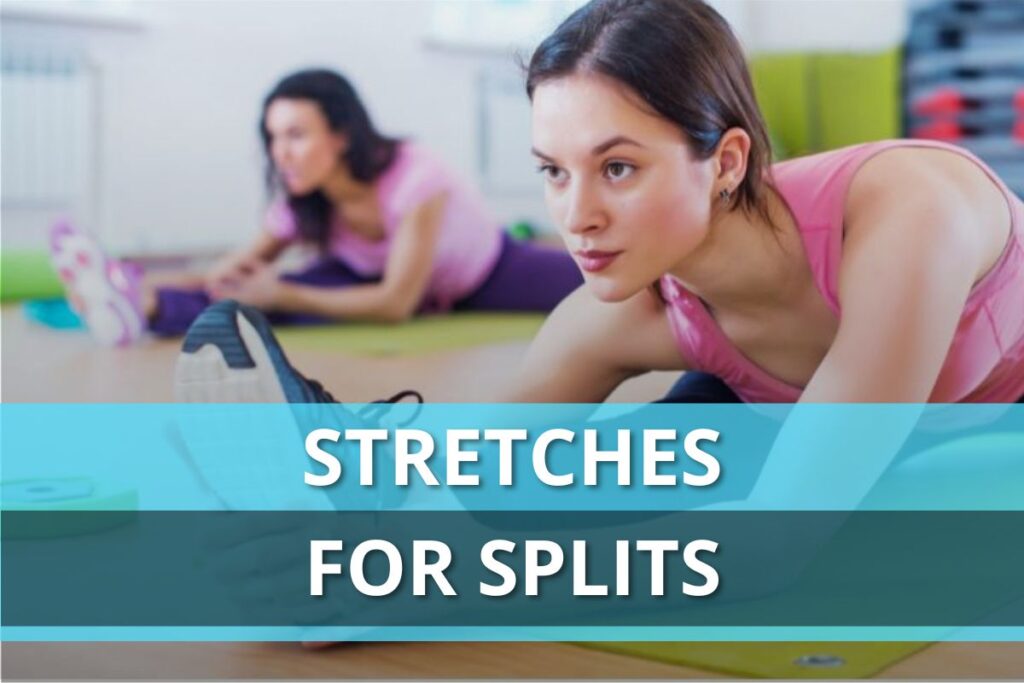
Benefits of Stretching for Splits?
Stretching for splits offers a plethora of benefits, even beyond the fact that you’ll become extremely flexible. Therefore, engaging in splits stretches will go a very long way in improving your overall flexibility. It will improve your range of motion as well.
Consistently performing stretches to get splits would certainly improve muscular flexibility, which will be very beneficial in your physical endeavors and daily movements. Not only that, but split stretches will also improve your body alignment and posture. When the muscles involved in splits are stretched, the muscle tightness and imbalances almost seem to disappear!
This can have a positive impact on daily activities and sports performance and even reduce the risk of certain injuries.
If we’d brief more about the advantages, then incorporating these stretches would also significantly enhance your muscular performance. Stretching these certain muscle groups increases the elasticity and flexibility, thus bettering the muscular contractions.
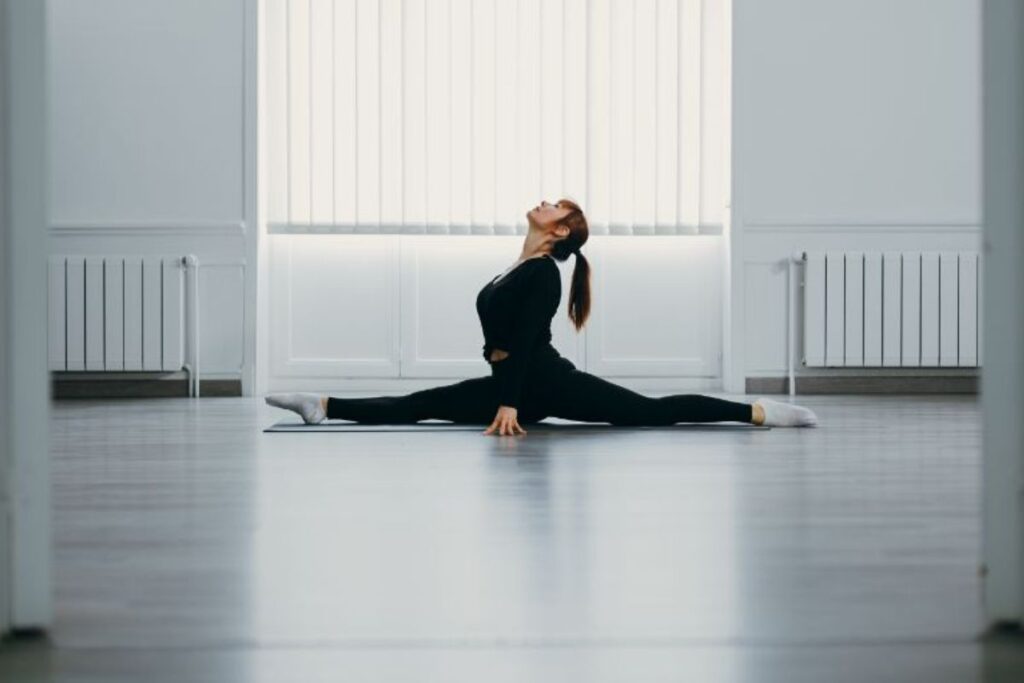
All in all, it makes up for an improved athletic performance and a reduced risk of muscular tears and strains on the field.
Furthermore, these stretches would always provide a sense of mental and physical relaxation to some degree. Because it requires a lot of concentration and focus, Engaging in such exercises would surely help in relieving stress and clearing the mind. The slow and deliberate movements would make things even more rejuvenating and relaxing.
All in all, the benefits of stretches for splits and flexibility are plenty, and it’s more than just flexibility. Moving on, let’s take a look at some of the main benefits of performing splits in detail.
1. Improved Flexibility
The most obvious and prominent benefit, splits would greatly help increase the flexibility of your tendons, ligaments, and muscles. Therefore, even your range of motion in various activities would be drastically increased.
2. Increased Range of Motion
As mentioned previously, when you regularly engage in splits and stretches, you’ll be able to increase your range of motion. Now, when you have a better range of motion, you will be able to perform a movement with better fluidity and ease than earlier, and it feels amazing.
3. Enhanced Muscle Flexibility
Split stretches target certain muscle groups like the hamstrings, hip flexors, quadriceps, calves, and lower backs, so it would increase the flexibility and suppleness of those muscles.
4. Better Posture and Body Alignment
This is another very prominent benefit of stretching the muscles that are associated with splits. Because it corrects muscular imbalances, it also corrects body alignment and helps in improving your posture.
5. Reduced Muscle Imbalances and Tightness
Splits stretches relieve muscular imbalances and tension, which improves muscle function and lowers the chance of pain or injury.
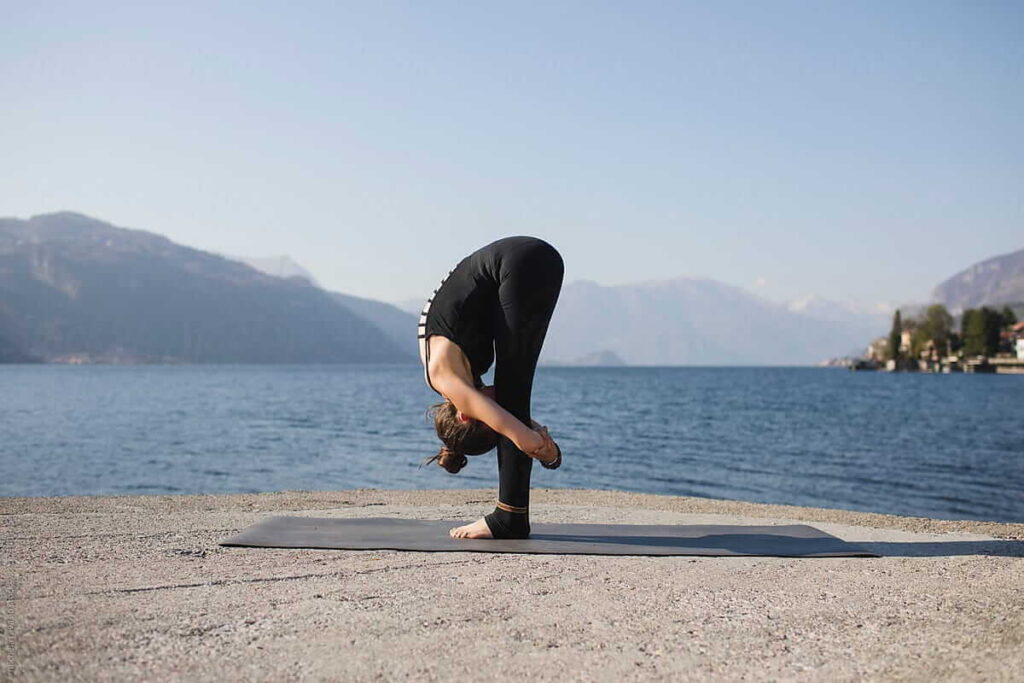
6. Improved Athletic Performance
By enabling more effective motions and lowering the risk of strain, increased flexibility and range of motion via splits stretches can improve athletic performance.
7. Reduced Risk of Muscle Strains and Tears
Regularly stretching your muscles with split stretches will improve their flexibility and suppleness and reduce your risk of tearing or straining a muscle while exercising.
8. Mental and Physical Relaxation
Stretches called splits include slow, deliberate movements and focused breathing that promote relaxation and allow the body and mind to unwind.
9. Stress Reduction
Since the deliberate stretching regimen that emphasizes splits encourages relaxation and helps cleanse the mind, it can help reduce stress levels.
10. Regenerating the Body
Stretching your splits may rejuvenate your body, leaving you feeling refreshed, energized, and more balanced.
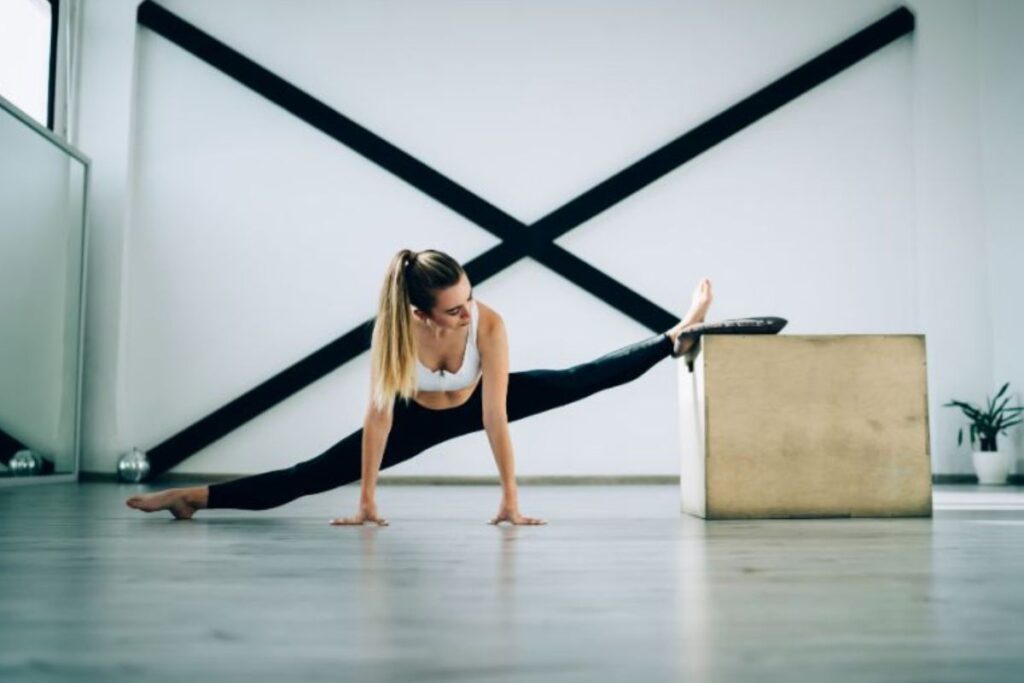
Best Stretching Methods for Splits
To accomplish the amazing task of mastering the splits, it is essential to incorporate effective stretching techniques. Stretching routines for splits put a strong emphasis on increasing muscle flexibility to get the body ready for the difficult position. There are a number of recommended stretching techniques that might assist you in getting closer to the splits.
One of the most effective split stretches is the seated forward bend. Legs out in front of you, sit down on the floor. With a slow forward motion, try to touch your toes or beyond. By concentrating specifically on these muscles during this stretch, the hamstrings, calves, and lower back are all made more flexible.
Lunges are another stretch exercise for splits. Take a big step forward while maintaining your back leg straight and bending your front knee. Stretching the hamstrings, quadriceps, and hip flexors in this position is helpful. To achieve equal stretching, alternate between the two legs.
The butterfly stretch is an excellent technique to open up the inner thighs and hip joints. Sit on the floor, bring the soles of your feet together, and gently press your knees toward the ground. This stretch aids in developing flexibility in the inner thigh muscles, which play a significant role in achieving the splits. Lunges are another stretching exercise that is good for splits. Take a big step forward while maintaining your back leg straight and bending your front knee. Stretching the hamstrings, quadriceps, and hip flexors in this position is helpful. To achieve equal stretching, alternate between the two legs.
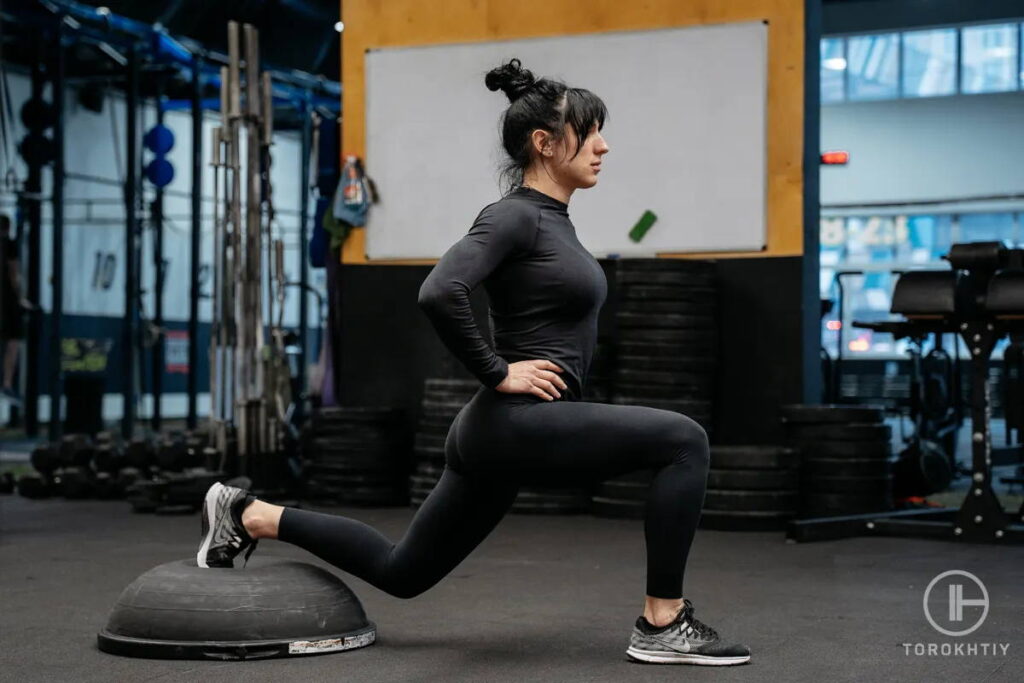
Additionally, the standing forward bend can contribute to overall flexibility for splits. Stand with feet hip-width apart and slowly fold forward, reaching towards the ground. This stretch targets the hamstrings, calves, and lower back, helping to increase flexibility in those areas.
Remember, consistency is key when performing stretching exercises for splits. Aim to stretch daily, gradually increasing the intensity and duration of each stretch. Additionally, always warm up before stretching to ensure the muscles are properly warmed up and less prone to injury.
By incorporating these stretching methods for splits into your routine and staying dedicated to your flexibility training, you can gradually improve your range of motion and move closer to achieving the coveted splits position.
Follow us!
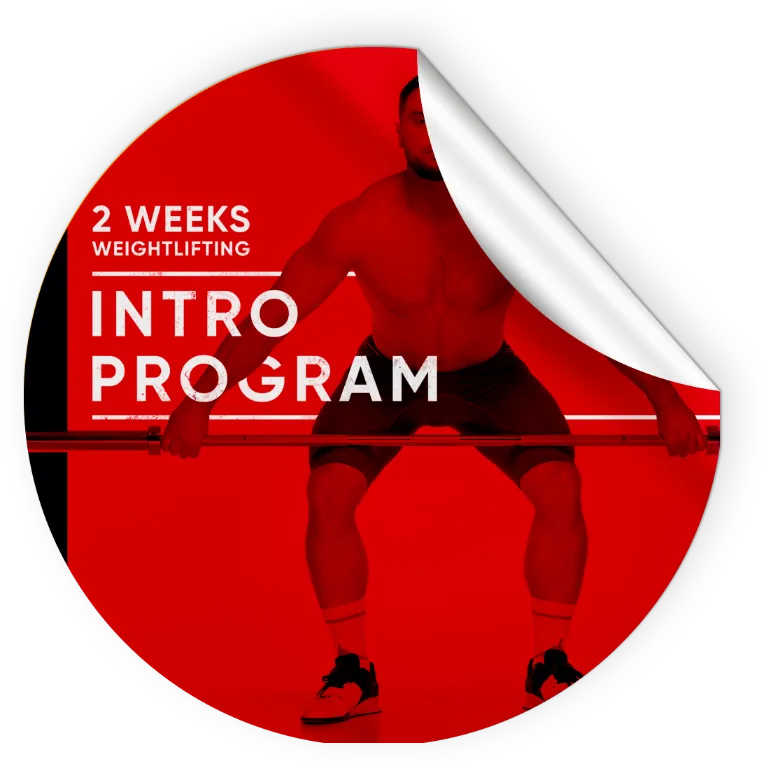
Free!
Get a 2-week Weightlifting Program as a bonus for the subscription to kickstart your training plan!

Free!
1. Seated Forward Bend
Start by sitting on the floor with your legs extended in front of you. Take a deep breath and slowly begin to reach forward, lengthening your spine and engaging your core. As you exhale, continue to reach forward, aiming to touch your toes or go beyond. Feel the gentle stretch in your hamstrings, calves, and lower back. You can modify this stretch by using a strap or towel around your feet to help you reach a bit further. Hold this position for 20-30 seconds, focusing on relaxing and deepening the stretch with each breath. The seated forward bend helps to lengthen and loosen the muscles in the back of your legs and lower back, gradually increasing your flexibility for splits.

2. Lunges
Start in a standing position with your feet hip-width apart. Take a big step forward with one foot, keeping your front knee directly above your ankle. Lower your body by bending the front knee while keeping your back leg straight. Sink into the lunge and feel the stretch in your hip flexors, hamstrings, and quadriceps. Keep your upper body tall and engage your core for stability. Hold the lunge for 20-30 seconds, then switch legs and repeat. Lunges not only improve flexibility but also help to strengthen the muscles needed for splits.
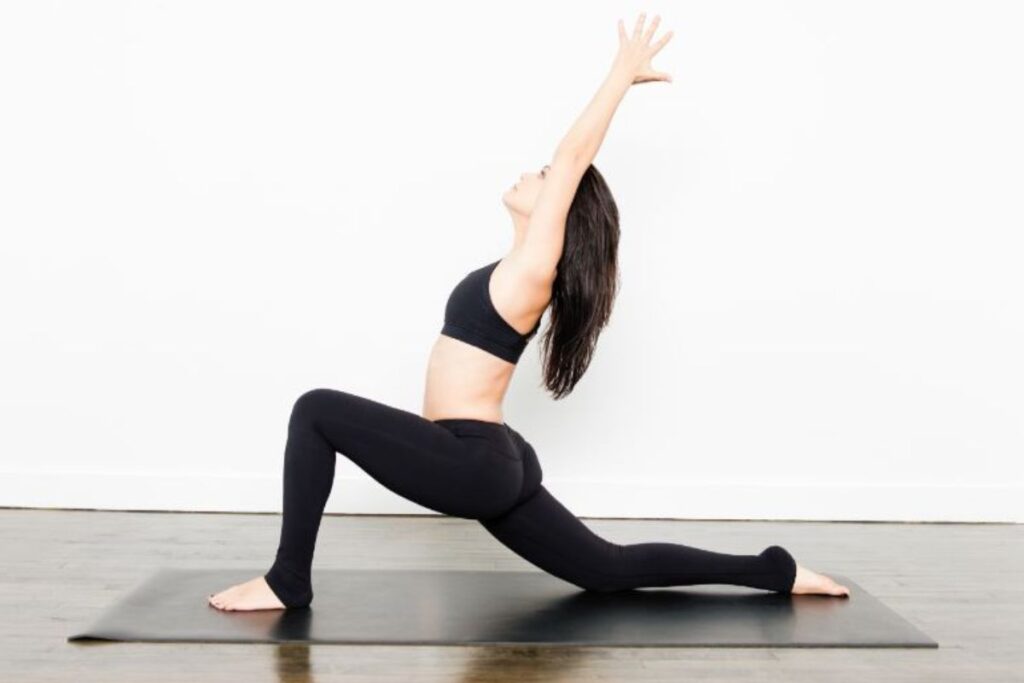
3. Butterfly Stretch
Sit on the floor and bring the soles of your feet together, allowing your knees to fall outward. Hold onto your feet or ankles, and gently press your knees down towards the ground. Feel the stretch in your inner thighs. You can use your elbows to apply light pressure on your knees for a deeper stretch. Relax and breathe deeply as you hold this stretch for 20-30 seconds. The butterfly stretch targets the adductor muscles, which are important for achieving the splits. It helps to increase flexibility in the inner thighs and hips.
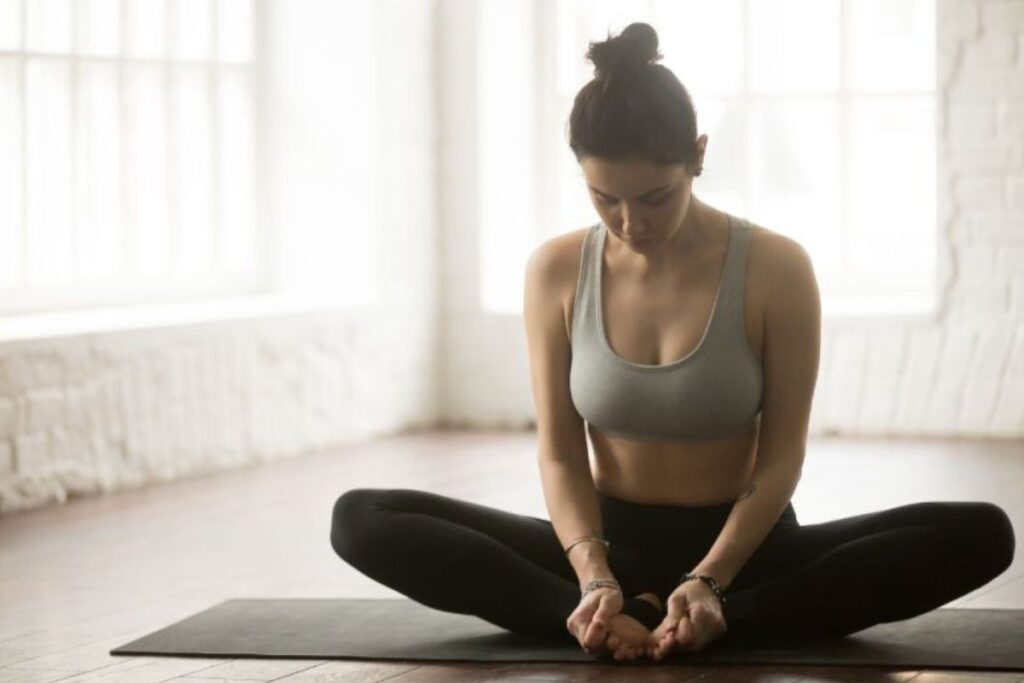
4. Standing Forward Bend
Begin by standing with your feet hip-width apart. Take a deep breath in, and as you exhale, slowly fold forward at the hips. Allow your upper body to hang freely and relax. Bend your knees slightly if needed to release tension in your hamstrings. Feel the stretch in your hamstrings, calves, and lower back. You can hold onto your shins, ankles, or the floor for support. Hold this position for 20-30 seconds, focusing on relaxing and surrendering to the stretch. The standing forward bend helps to lengthen the muscles in the back of your legs and promotes flexibility for splits.
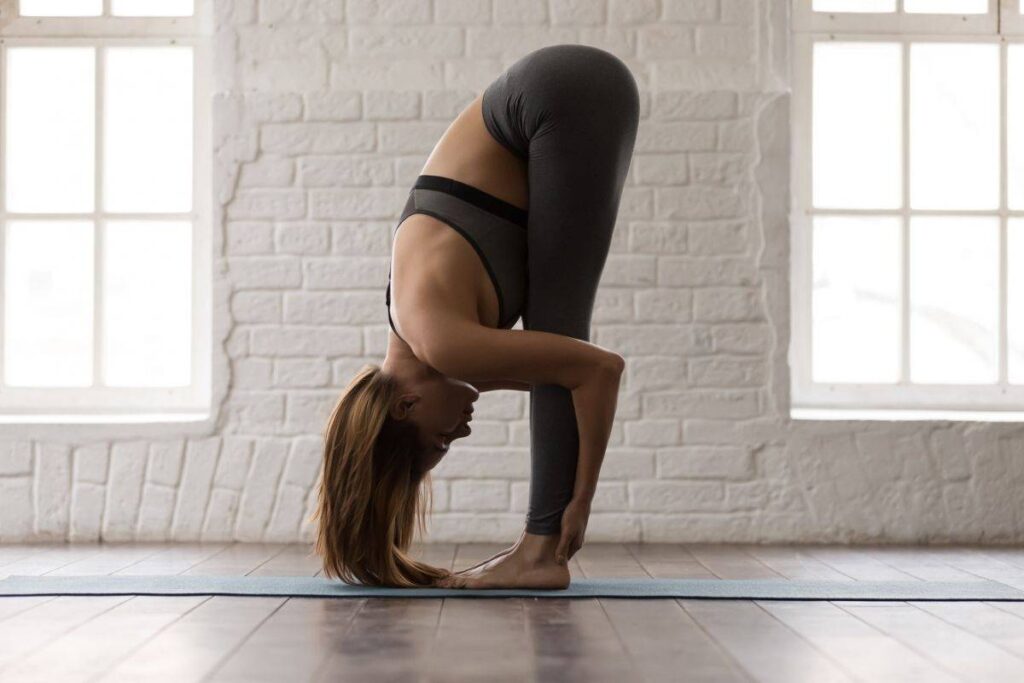
Always pay attention to your body’s signals and avoid forcing stretches. Over time, gradually increase the force and length of each stretch. Make these stretches a regular part of your flexibility practice to show improvement on your path to mastering the splits. Consistency is crucial.
Best Preparation Exercises for Splits
It’s essential to increase leg flexibility when getting ready for the splits. You can gradually gain the flexibility required for splits by incorporating specialized leg stretches into your practice. These preparatory exercises will help you become more flexible in your legs and move you one step closer to performing the splits.
1. Lunges
Leg stretching and warming exercises like lunges are quite effective. Step forward on one leg, lowering your torso and bringing the front knee to the ankle. In this position, the hamstrings, quadriceps, and hip flexors are all stretched. Replicate on both sides to ensure balanced stretching.
2. Quadriceps Stretch While Standing
As you hold your foot in your palm and stand tall, bring one heel toward your glutes. Feel the stretch in your quadriceps by gently bringing your heel closer to your glutes. Hold each leg for 20 to 30 seconds. The quadriceps, which are involved in splits, can be more flexible with the help of this stretch.
3. Hamstring Stretch
As you place it on the ground with your soles touching, your knees should hang out to the sides. As you softly press down with your elbows on your thighs, feel the stretch in your inner thighs. Hold this position for 20 to 30 seconds. The butterfly stretch helps to loosen up the hips and increases the flexibility of the inner thigh muscles.
4. Calf Stretches
Daily leg stretches for splits should be incorporated. Before stretching, always warm up, and never go above your comfort level. Increase the length and force of each stretch progressively to learn how to build flexibility for splits. Consistency and endurance are key as you attempt to master the splits.
5. Butterfly Stretch
Your knees should hang out to the sides as you place them on the floor with your soles touching. Feel the stretch in your inner thighs as you gently press down with your elbows on your thighs. For 20 to 30 seconds, maintain this posture. The inner thigh muscles’ flexibility is increased, and the butterfly stretch aids in opening up the hips.
Daily leg stretching for splits should be incorporated. Before stretching, always warm up, and never go above your comfort level. Increase the length and force of each stretch progressively to learn how to develop flexibility for splits. Consistency and endurance are key as you attempt to master the splits.
3 Secrets to Get Split
The key to knowing how to get better at splits is not magical; rather, they consist of persistent effort, correct technique, and patience. These three key strategies can aid in your progression toward mastering the splits and establish the groundwork for effective split training.
Combining a few techniques will help you become more adept at doing the splits can be a good option. The main aspects that contribute to success are consistency, appropriate technique, and patience. Maintaining consistency in your stretching exercises can happen when you start setting out time each week to improve your flexibility. Your muscles will eventually adjust and become more flexible if you stick to a routine and stretch several times per week. To prevent injury and increase efficiency, stretching exercises must be performed with the proper form. It involves having the proper form, using the appropriate muscles, and advancing at a safe rate. Since flexibility takes time to develop, patience is essential. It’s crucial to realize that everyone experiences growth differently and to accept the gradual nature of the process.
Even while getting the splits may seem difficult, you may advance significantly with the appropriate strategy. The first key to mastering splits is consistency. By committing to a consistent stretching regimen, you give your muscles time to adjust and develop greater flexibility. Consistency is crucial, whether you stretch three times a week or include it in your everyday routine.
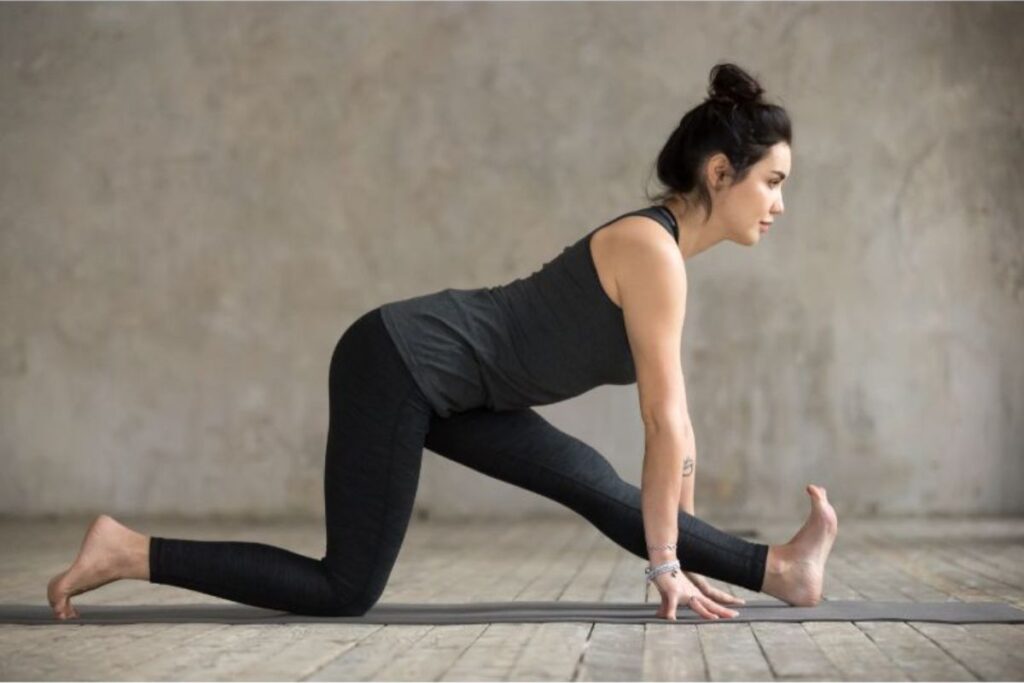
Another essential element of success is proper technique. You may stretch efficiently and avoid injuries by paying attention to your technique, using the right muscles, and avoiding abrupt movements or overexertion. Progressing gradually is also crucial. It’s critical to respect your body’s limitations and take your time. Accept patience, and reward yourself for even the slightest strides that you take forward in your quest for flexibility.
Keep in mind that each person will have a different path to mastering the splits. Focus on your own development instead of making comparisons to others. You may gradually increase your flexibility and get closer to mastering the splits with consistency, the right technique, and patience. Accept the process, relish the incremental successes, and have faith that with effort, perseverance, and a positive outlook, you will realize your potential and accomplish your objectives.
Let’s take a detailed look at each secret now.
1. Consistent Stretching Routine
It is no secret, but it is indeed a secret because everybody seems to forget about the minute details while paying so much attention to the bigger picture. No matter what exercise it is or what aspect of life it is, consistency is key. In this case, it is the key to improving your flexibility for splits. So, have a regular stretching routine and stick to it. Put consistent efforts and make it a non-negotiable part of your day by prioritizing it.
2. Proper Technique
Having proper form during your stretching exercises is crucial for effective and safe progress toward mastering the splits. Start by warming your muscles up with a light cardiovascular activity or dynamic stretches to increase blood flow and prepare the body for the upcoming stretching.
While you perform split-specific workouts, try to have good form and body alignment. It is achieved by engaging the correct muscles and avoiding any sudden or jerky movements that can strain or injure the muscles. Rather than that, simply ease into each stretch gradually, breathing deeply and relaxing into the position. Always know to listen to your body and respect its limits, steering clear of any pain or discomfort. As you practice proper technique consistently, your muscles will respond better and become more flexible, bringing you closer to the splits.

3. Patience and Gradual Progression
A flexible body is not something you can achieve with a few stretches. As mentioned above, it takes consistency, mastery of the perfect form, and, biggest of all, a patient mind. You need to make do with the fact that progress is there, but it is very gradual. Instead of getting disappointed, set smaller realistic goals and a bigger end goal, and celebrate every small victory.
By knowing and working with these secrets in your split training, you’ll directly be building a very strong foundation in terms of physical fitness. Complement this with consistency, patience, and proper form, and you’ll reach your fitness-related goals in no time. Your range of motion will gradually improve, and you’ll be getting better and better every time.
Always embrace the journey, trust in your body’s capabilities, and listen to it when it needs rest and recovery. With time and perseverance, you will see remarkable progress and enjoy the benefits of increased flexibility.
FAQ
Does Stretching Help With Splits?
Indeed. Stretching is highly important for improving your flexibility and achieving the ideal form while performing splits. Therefore, regular stretching routines are a must as they increase the range of motion of your muscles and also lengthen them, thus, preparing your body for the splits.
How Much Stretching per Day for Splits?
If you want to make significant progress towards the splits, you should be aiming for at least 15-30 minutes of stretching for at least 4-6 days a week. Once again, consistency is where the key lies, so be sure not to skip a day. Regularly practicing will make your muscles routined to it and make you more flexible.
Is Stretching for Splits Every Day Good?
Although stretching for splits on a daily basis can have great effects on your body, it needs some rest to recover as well. So, listen to your body since it’ll let you know when you’re overstretching. Then, take breaks accordingly in order to prevent injuries. Always have a balanced approach between exercising and rest days for ideal recovery.
Can You Force Yourself to Do the Splits?
It is best not to force yourself into splits or any other exercise, for that matter. It could lead to injury, so the best thing to do would be to progress gradually and respect the limitations of your body. Avoid discomfort, be patient and consistent, and you’ll see that your limitations will be reduced drastically!
Conclusion
So, that was all that is needed to know to master splits. Following these tips with maintaining patience and consistency while also giving your body enough time to rest will go a long way. If you have any more stretches-related tips, let us know in the comment section.
Also read:
- How to Do a Handstand
- How to Do a Wall Handstand
- Handstand Drills
- How to Do a Press Handstand
- How to Do Side Splits
- How to Learn the Splits in 30 Days
- Front Splits
References:
- Chronic Effects of Static Stretching Exercises on Muscle Strength and Power in Healthy Individuals Across the Lifespan: A Systematic Review with Multi-level Meta-analysis // NCBI: https://pubmed.ncbi.nlm.nih.gov /36719536/
- The effects of different durations of static stretching within a comprehensive warm-up on voluntary and evoked contractile properties // NCBI: https://pubmed.ncbi.nlm.nih.gov /29721606/
- The Effectiveness of Post-exercise Stretching in Short-Term and Delayed Recovery of Strength, Range of Motion and Delayed Onset Muscle Soreness: A Systematic Review and Meta-Analysis of Randomized Controlled Trials // NCBI: https://pubmed.ncbi.nlm.nih.gov/ 34025459/
- Photos by carloprearophotos, Canva.com; Viorel Kurnosov, Canva.com; Gaudilab, Canva.com; undrey, Canva.com; fizkes, Canva.com; jentakespictures, Canva.com.
Why Trust Us?
With over 20 years in Olympic weightlifting, strength training, nutrition coaching, and general fitness our team does its best to provide the audience with ultimate support and meet the needs and requirements of advanced athletes and professional lifters, as well as people who strive to open new opportunities and develop their physical capabilities with us.
By trusting the recommendations of our certified experts in coaching, nutrition, and sports training programming, as well as scientific consultants, and physiotherapists, we provide you with thorough, well-considered, and scientifically proven content. All the information given in the articles concerning workout programming, separate exercises, and athletic performance, in general, is based on verified data.
The product testing process is described in more detail here.
Author: Oleksiy Kononov
Former Cirque Du Soleil Artist
Ukrainian Gymnast
More than 25 years ago Oleksiy started his sports career. He major in gymnastics which is definitely not an easy sport to go in for!
To become an athletic champion (in Ukraine, for instance, we mean here the title of “Master of Sports”) in gymnastics, one needs to spend at least 10 years and start training no later than being six years old. As for Oleksiy, he has fulfilled all the criteria.
During this period of time, definitely not short, he managed to become:
- Master of Sports, Champion of the State and International Tournaments;
- Member of the national team of Ukraine, having a perfect opportunity to train the best team ever!
- Part of Cirque Du Soleil team (as an artist).
Reviewed by: Oleksiy Torokhtiy
Olympic Weightlifting Champion, PhD in Sport Science
Best Results: Snatch – 200 kg,
C&J – 240 kg
Oleksiy Torokhtiy is a professional athlete boasting 20 years of experience in Olympic weightlifting. With multiple European and World titles under his belt, he has showcased his prowess in two Olympic Games (Beijing 2008 and London 2012). Upon concluding his illustrious career, Oleksiy dedicated himself to coaching. By 2022, he had conducted over 200 weightlifting seminars worldwide. He is the visionary behind an international sportswear and accessories brand known for its motto, “Warm Body Cold Mind.” Additionally, he is an esteemed author and the creator of a series of training programs and eBooks.

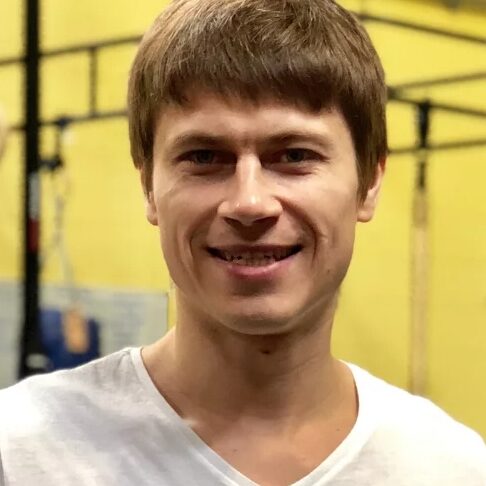
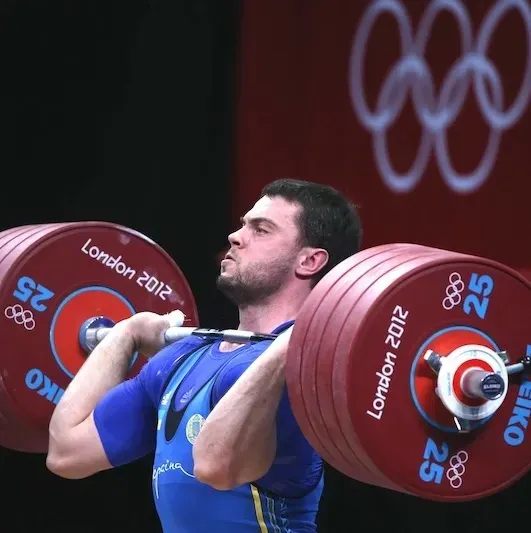

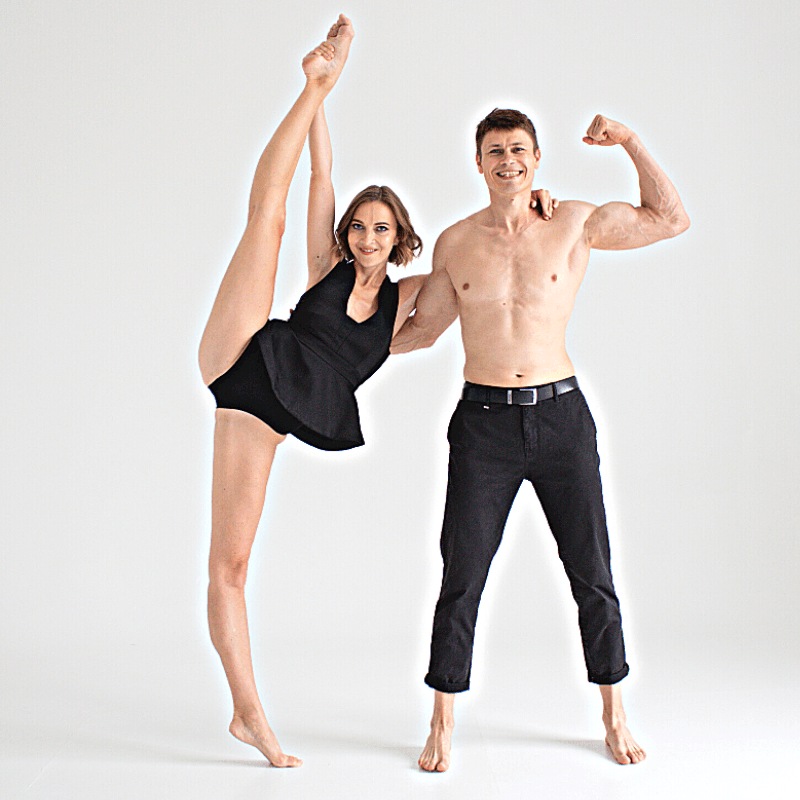
Still have questions after reading our article? Unlock your full potential by engaging with our experts and community! Don’t hesitate — leave a comment below and Oleksiy Kononov will provide a personalized answer and insights to help you reach your goals.